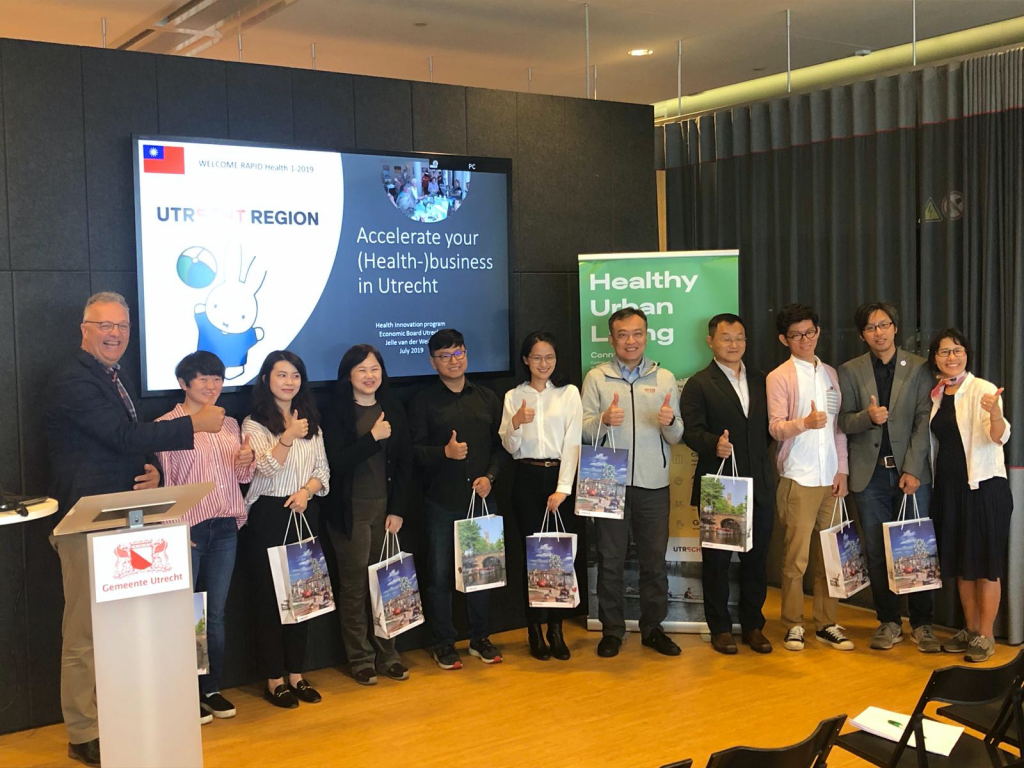Taiwan is increasingly becoming known internationally as a source for state-of-the-art medtech innovations. Taiwan has long been a global leader both in the field of information technology and in the field of medicine. Combining these strengths and expertise, Taiwanese businesses are now consistently introducing new health technology solutions not only to the country’s own population, but also to healthcare systems around the world.
Since 2015, the Economic Board Utrecht has been working with Taiwan Globalization Network-TGN to create a soft-landing bridge for Taiwanese medtech companies to develop their businesses in the Netherlands and Europe via the Utrecht region, which is positioned as the model region for self-management in Europe. It is often the case that Taiwanese technology can fill specific gaps in the local healthcare ecosystem, and therefore bring significant value to the Dutch health sector.
The latest success in this collaboration was the Rapid Health program that took place in fall 2019. By the end of the program, 6 participating Taiwanese medtech companies were each able to achieve deals with future partners in the Netherlands, and thus can start growing their businesses in the European market.
What is Rapid Health, and who is it for?
The collaboration between the Utrecht municipality and Taiwan first started in the form of trade missions and the signing of MOUs between Utrecht and Taiwanese cities. However it was understood that in order for this collaboration to proceed effectively and meaningfully, it also needed to be organized on the ground-level. That is to say, it needed to be arranged in a way that’s accessible for the organizations and companies that will actually be engaging with each other in the two countries. The 4-week Rapid Health program was initiated to meet this need.
“We saw that there was a gap between trade missions and talking high-level visionary things, and real soft landing”, Jelle van der Weijde, Director of Domain Health Economics of the EBU, spoke about the origin of the Rapid Health program. “We saw there is a possibility to help companies to understand what it really means to go to the Netherlands from Taiwan.”
Additionally, van der Weijde also pointed out that Rapid Health was designed for Taiwanese companies with a certain level of maturity, both in terms of their technology’s readiness level, and their real willingness to come to the Netherlands. Its main focus is to help the Taiwanese businesses understand the Dutch market, including how the healthcare system works in the Netherlands, what types of business models are possible in this context, and what risks might be involved. While many of the Taiwanese companies were initially very product-focused, during their engagement with Utrecht’s health ecosystem through the Rapid Health program, they were able to develop a deeper insight into the real needs of local stakeholders, and thus develop a better understanding of how their product/service fits in.
In this way, Rapid Health also bridges the gap between the Taiwanese medtech companies and other European accelerators. Once the companies understand the market better, they will also have a better vision on the expertise they need to develop in order to grow in the European market, and therefore they can determine which accelerator would suit their needs best.
“The Rapid Health program helps prepare startup companies in a professional manner and create precious business opportunities from their network, through the network of the program, which increases the chance of collaborating with quality Dutch partners.”, said Wayne Hou, Business Development Specialist at MedicusTek, one of the participating Taiwanese companies. “ As a business developer, I must say this is an ideal program for startups to explore and participate in.”
“With the RAPID Health Program we’re able to find clinical collaborators and the way to access the EU market.”, said Yichen Lee from Neurobit. “The RAPID Health Program and TGN are very successful in assisting medical startups in regional networking, market accessibility and clinical study collaboration.”
“We are very pleased to join the one month RAPID Health program at Utrecht, Netherlands. With hospitality and kindness we feel we are welcomed and well accepted.” Said David Lee, General Director of Singular Wings Medical. “(Our company) has connected to several cooperation opportunities as well as potential investors. We are seriously considering expanding our business to the vast EU market. Utrecht is a good doorway.”
The 6 Rapid Health medtech alumni
There were 6 Taiwanese companies that successfully established partnership with Dutch stakeholders during the Rapid Health program. Each of them specializes in a different area of medical product/service. From looking at these first Rapid Health alumni, it is possible to have an impression of Taiwan’s diverse technological portfolio in the medtech sector:
Singular Wings Medical developed a live ECG monitoring system for heart patients, with prediction and alarm functions, to avoid sudden death by enabling medical professionals to rescue patients in time.
MedicusTek is dedicated to improving patient safety with IoT technology. The company’s focus is on its Sensable®Care System, including sensor pads in bed with unique behavior algorithm to enable more personalized care for patients with high risk of falls and patients who are long-term bedridden.
MatrixLabs developed a new innovative method to stitch together small surgical wounds after an endoscopy, the so-called Knit-Knotter method.
Neurobit is developing an automatic eHealth system with AI to identify stroke patients seamlessly with high accuracy. This includes a glasses shaped device that records the movements in a patient’s eyes to detect and predict strokes.
Vibrasee developed a device that uses optic method and AI system to measure and recognize micro-tremors in the hand of patients , in order to achieve early diagnosis of conditions such as Parkinson’s Disease.
Redeye is a hemoglobin sensor that can detect the invisible blood direct from the toilet. Invisible blood in stool could be a symptom of colorectal cancer. This method does not have to collect samples and is chemical free compared to the existing methods. Redeye aims to achieve no pain, contactless and non-invasive.

